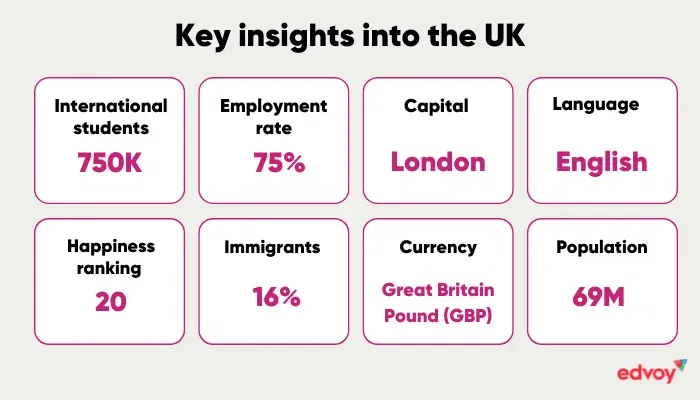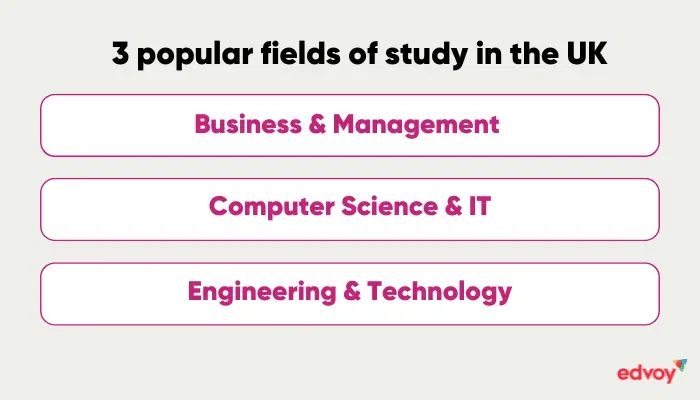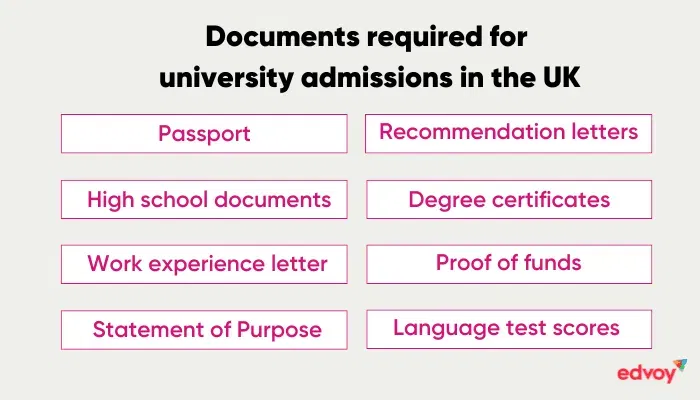The UK is a popular study abroad destination with prestigious and highly ranked universities offering globally recognised degrees and exposure to the international job market. The UK universities maintain high academic standards and are periodically evaluated by the Quality Assurance Agency.
With state-of-the-art campuses, industry-centred curricula, and rich cultural exposure, UK universities attract a large number of international students from around the world.
Here are a few key insights about the UK.

Get the complete guide to studying in the UK.
Moving to a new country is a big change in many ways: geographically, culturally, and psychologically. So, if you're concerned about the best courses in the UK, it’s likely that you'll have concerns about various other aspects of life in the UK. No worries.
Our experts have sorted it out for you in the table below. Click on the topics you’re interested in and get the must-have information you’re looking for.
| Student life in the UK | Student visa in the UK |
| Education system in the UK | Cost of living in the UK |
| Best universities in the UK | Employment opportunities in the UK |
Selecting the right course for your higher education is essential for enhancing your career prospects. The course you choose should align with your aptitudes and career goals, and also have a strong demand in the job market.
Your academic knowledge, professional skills, and overall growth depend significantly on the course you pursue. UK universities offer a wide selection of courses with a comprehensive curriculum, industry-oriented training, placement opportunities, and excellent career prospects. Keep reading for more insights on the best courses in the UK.
Study levels
The study levels in the UK range from foundation courses to undergraduate, postgraduate, and doctoral programmes. Check out the table below for more details about study levels in the UK.
| Study level | Description | Eligibility | Duration |
|---|---|---|---|
| Foundation | Introductory course that prepares you for undergraduate study. | There are no specified entry requirements. It’s for students who do not meet the entry requirements for undergraduate programmes. | 1 year (foundation year/diploma); 2 years (foundation degree) |
| Undergraduate | First-level degrees, which can be pursued after secondary education, includes related qualifications (CertHE, HNC, HND) | You must have completed 12 years of education, equivalent to A levels. | 3-4 years; shorter for CertHE, HNC, HND |
| Postgraduate | Specialised study after bachelor's; includes Master's degrees, PGCert, PGDip | Bachelor's degree or equivalent | 1-2 years (master's); shorter for PGCert/PGDip courses |
| Doctoral | Highest academic level: PhD, DPhil and professional doctorates | Master's degree | 3-4 years for full-time and 5-7 years for part-time study |
Popular fields of study
UK universities offer a wide selection of in-demand courses across all study levels. You can access a diverse range of subjects that are aligned with global market trends and prepare you for successful careers.
The popular fields of study in the UK include Business & Management, Computer & IT, Engineering & Technology, Law, Media Studies, Hospitality, and Psychology.
Take a look at the 3 popular fields of study in the UK.

Business & Management
Studying a management course in the UK equips you with the skills for planning and directing the operations of a business. Many highly ranked universities, including the University of Oxford, offer Business Management courses with specialisations in Marketing, Human Resources, International Business, and Strategic Management. Most courses are accredited by professional bodies and also incorporate experiential learning to prepare you for the real world.
Computer Science & IT
The UK, with its strong technological growth, provides numerous opportunities in the field of Computer Science & IT. You can pursue industry-oriented courses from world-renowned universities with options to choose from exciting specialisations, including advanced computing, cybersecurity, and artificial intelligence. Computer science graduates from UK universities are highly employable, equipped with a strong academic foundation and industry-relevant skills such as problem-solving and technical ability.
Engineering & Technology
UK universities promote a culture of innovation and are the best choice for pursuing a degree in Engineering & Technology. Engineering courses in the UK are shorter compared to other countries and provide in-demand specialisations such as Civil Engineering, Mechanical Engineering, Aerospace, and Biomedical Engineering. With state-of-the-art campuses, research focus, and strong industry connections, UK universities prepare you for an international career.
Admission requirements
Below are the common admission requirements for UK universities.

The application process
The first step in the application process is to identify your areas of interest and select the right course and university. Once you’ve finalised the university, visit the university’s website and review the eligibility requirements. This includes your academic scores, language test scores, work experience letter, statement of purpose, CV, and other documents. You can apply for undergraduate courses through UCAS.
English proficiency
You must provide your English language proficiency scores during admission. This can be an IELTS, TOEFL, or PTE score. Typically, an IELTS score between 6.0 and 7.0 is required. A score of 6.0 is expected in reading, listening, speaking, and writing. TOEFL scores range between 90 and 100, while PTE scores range between 50 and 75.
Other standardised tests
Many universities require subject-specific tests such as LNAT, UCAT, or BMAT. You may also need to provide test scores of GMAT, GRE, or SAT. These requirements may vary based on the course and university.
Intakes for UK universities
UK universities have three intakes: September/October, January/February, and April/May. The September/October intake is the most popular due to the wide choice of courses.
Recommended undergraduate courses in the UK
Here are the recommended undergraduate courses in the UK that provide a strong academic foundation and enhance your employability.
| Study fields | Courses | Career roles |
|---|---|---|
| Business & Management | BA Business and Management with Year in Industry | Human Resource Manager, Marketing Executive, Business Analyst, Sales Manager |
| Computer Science & IT | Software Developer, Systems Analyst, IT Support Specialist | |
| Engineering & Technology | BEng (Hons) Electronic & Electrical Engineering (Energy Systems) with Placement | Civil Engineer, Mechanical Engineer, Electrical Engineer, Design Engineer |
| Finance | Finance Analyst, Accountant, Credit Analyst, Financial Planner | |
| Psychology | Research Assistant, Mental Health Support Worker, Rehabilitation Specialist | |
| Law | Legal Assistant, Paralegal, Compliance Analyst, Legal Researcher | |
| Media Studies & Communication | Journalist, Public Relations Officer, Event Coordinator |
Recommended postgraduate courses in the UK
Here are the recommended postgraduate courses in the UK that enhance your global perspectives and employability skills.
| Study fields | Courses | Career roles |
|---|---|---|
| Business & Management | MSc Business Analysis and Finance MSc International Business Management with Marketing MBA Business Administration with Professional Placement | Management Consultant, Corporate Strategist, Business Development Director |
| Computer Science & IT | MSc Computing for Data Science MSc Computer Science | Senior Software Architect, Data Scientist, IT Project Manager |
| Engineering & Technology | Engineering Manager, Research and Development Lead, Project Engineer | |
| Finance | Financial Manager, Investment Banker, Risk Manager, Chartered Accountant | |
| Psychology | MSc Psychological Research | Clinical Psychologist, Counsellor, Educational Psychologist |
| Law | LLM Corporate Responsibility and Business Law MA Law (Conversion) | Solicitor, Barrister, Legal Consultant, Corporate Lawyer |
| Media Studies & Communication | MA Digital Media and Communications (with Advanced Practice) | Media Planner, Communication Manager, Media Consultant |
Final thoughts
The UK is a popular destination for international students with prestigious universities offering a wide range of academic programmes. The courses in the UK are spread across in-demand disciplines including Business & Management, Computer Science & IT, Engineering & Technology, Psychology, Law, Healthcare, Finance, and Media Studies. With rigorous academic standards and industry-relevant curriculum, UK universities ensure that you are equipped with a solid theoretical foundation and practical exposure.
If you're seriously considering the UK for your higher studies, we have a good number of partner universities in the UK where you can apply for your preferred courses.
We’re a global technology-driven admissions platform offering study-abroad solutions to students across the world. Our AI-powered app simplifies course search, the application process, and enrolment in international universities. With 18+ years of experience, we’ve helped 100K+ students from over 65 countries to pursue their study-abroad dreams. You could be the next!
Let our counsellors clear all your concerns and help you start your study-abroad journey right away!
Frequently asked questions
Which course is most in demand in the UK?
The courses that are most in demand in the UK are fields with a need for skilled professionals, such as Artificial Intelligence, Engineering, Cybersecurity, Data Science, and Healthcare. These courses address industry needs and provide you with a rewarding career path with lucrative salaries.
Which course has high scope in the UK?
The courses with high scope in the UK include Engineering, Computer Science, Healthcare, Finance, and Business Management. Fields such as Data Science, Digital Marketing, and Artificial Intelligence also offer high growth potential.
Which degree is highly paid in the UK?
The highest paying degrees in the UK include Dentistry, Medicine, Economics, Engineering, and Computer Science. There is a growing demand for professionals in Medicine and Technology. As a result, these degrees offer excellent career prospects and lucrative salaries.